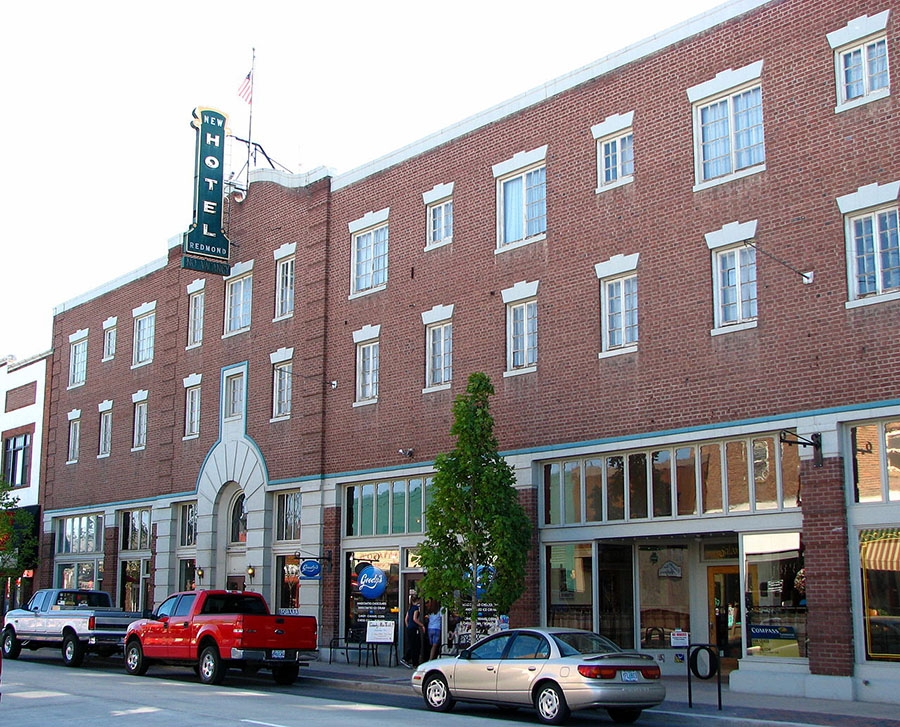The Main Street charm of walkable small-and medium-size downtowns has investors in search of faded lodgings they can repurpose for modern guests.
Across the state, investors, design buffs and small-town entrepreneurs are looking for historic properties to refurbish, often as niche investments too small for mainstream hoteliers but just right for small markets.
Call it the “McMenamins effect,” perhaps, but many cities now see refurbished lodging in their historic downtowns as a catalyst for growth, jobs and vibrant after-hours streets. Many are actively encouraging such development with incentives, tax breaks and loans.
In Redmond, a hotel built in 1928 that has been closed to guests since 2005 will reopen next year as a boutique, 46-room property. A rooftop bar with a view of the Cascades could open as soon as this summer.
The reopening of the Redmond Hotel means the story of the Central Oregon town will be “coming back to life,” says Eric Sande, executive director of the Redmond Chamber of Commerce.
“When that closed, it left an emptiness,” Sande says. “It was just the soul of our community; everything happened there. It’s just a really important building, iconic.”
Redmond’s Urban Renewal Agency offered a $749,000 loan to California-based developer Alpha Wave Investors to help buy the 43,500-square-foot building. Alpha Wave is expected to invest $2.8 million in renovations to the hotel, which sits at the corner of Sixth Street and Evergreen Avenue.
The loan, which will be forgiven once Alpha Wave operates the hotel for 10 years, made the deal workable, said Alpha Wave CEO Ken Cruse. So did the ground-floor retail, which is mostly occupied, although Cruse would like to see family-friendly options like an ice cream parlor and a deli. Most important, though, was that they saw Redmond as being poised for something big, like Bend 20 years ago.
“For years it’s been kind of a backseat to Bend,” Cruse says. “I think the trend now is such that maybe folks who moved to Bend are now seeing Bend as a little too big of a city, and are seeing Redmond as having those qualities before Bend was discovered.”
RELATED COVERAGE: TO ENLIVEN THE CITY, SALEM OPENS UP POSSIBILITES FOR ADAPTIVE REUSE
The Redmond Hotel is on the National Register of Historic Places, but Cruse said they’re not worried about restrictive guidelines for renovation. His company seeks out investments such as the Redmond Hotel because of their character or because they’ve been undervalued or underused. His company also recently purchased the Salishan Spa & golf Resort on the central Oregon Coast.
“It does have its limitations, which is actually not a problem for us because we really do intend to maintain the character of the historic building,” Cruse says. “We think that’s one of the factors that will draw people to the location.”
The hotel’s main entrance faces Cool & Collected, an antique mall owned by Mandy Koehler, who moved to Redmond from Bend. She’s thrilled that the hotel’s visitors will see her business across the street when they exit.
“They walk out the door and here we are. It’s perfect,” Koehler says.
In Wallowa County in the northeast corner of the state, the Jennings Hotel is similarly poised at the heart of tiny Joseph’s downtown. Owner Greg Hennes, who ran a photography equipment rental business in Portland, first looked at the property in 2010 on one of many visits to the region. He bought it in 2014 for $355,000, with financing from Community Bank.

Jennings Hotel, Joseph
“I just felt really compelled to buy this place, and drawn to this place,” he says. “I just kept coming back and eventually got to a point where I thought it was the right project for me.”
Hennes knew that conventional investors just weren’t going to be interested in the returns on a 14-room hotel – or a first-time hotelier. So Hennes financed the renovations with a $107,000 Kickstarter campaign.
The first rooms opened in 2015. Nine went online last summer, and he’ll finish up the final five this winter when occupancy rates are lower. (The hotel is closed Monday through Thursday in the winter until all of the rooms are complete.)
“It was just the soul of our community; everything happened there. It’s just a really important building, iconic.” — Eric Sande
“The thing that’s made it all work is sweat equity,” he says.
For Hennes, the hotel’s historic bones are less an homage to the past than a jumping- off point for modern design. Each room was envisioned by a different designer with a tight budget but full creative freedom. There’s no traditional front desk. Instead Hennes aimed the property at travelers used to booking through Airbnb, which is also how he manages reservations.
The experience draws a sort of independent, design-minded traveler who might not otherwise linger in a tiny Eastern Oregon town, he says.
Not everyone in Joseph may understand what he’s doing with the hotel, but “almost everyone has been universally pretty awesome,” says Hennes.
“Small business is pretty much the norm out here,” Hennes says. “A lot of people understand what it’s like. The truth is, it’s still a rural place where it’s difficult to make a living, and you have to be committed to figuring out what’s going to work.”




